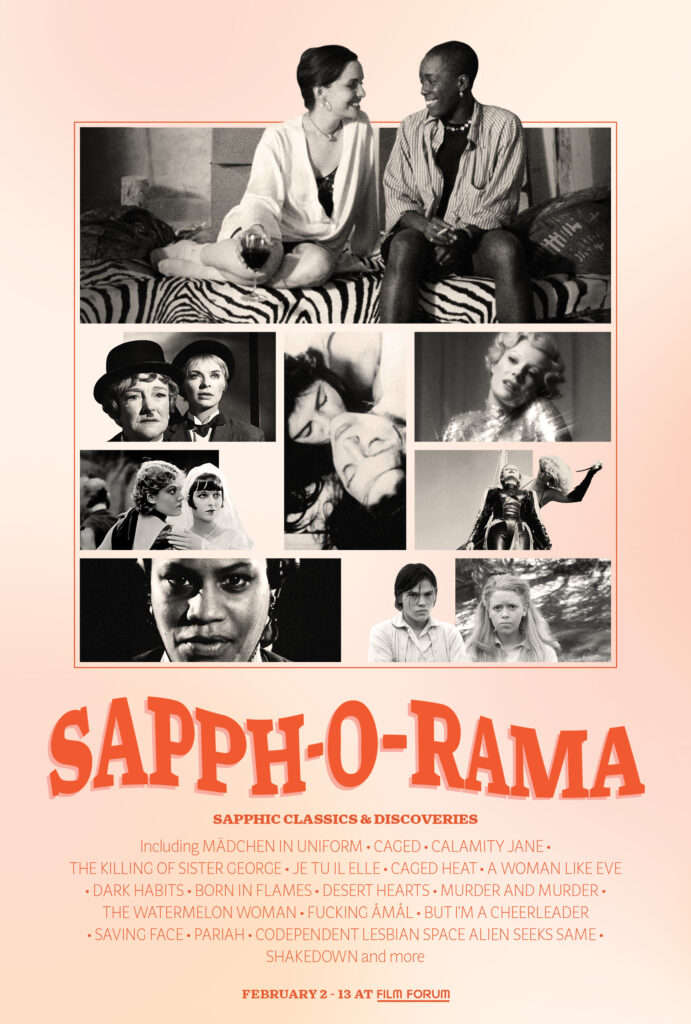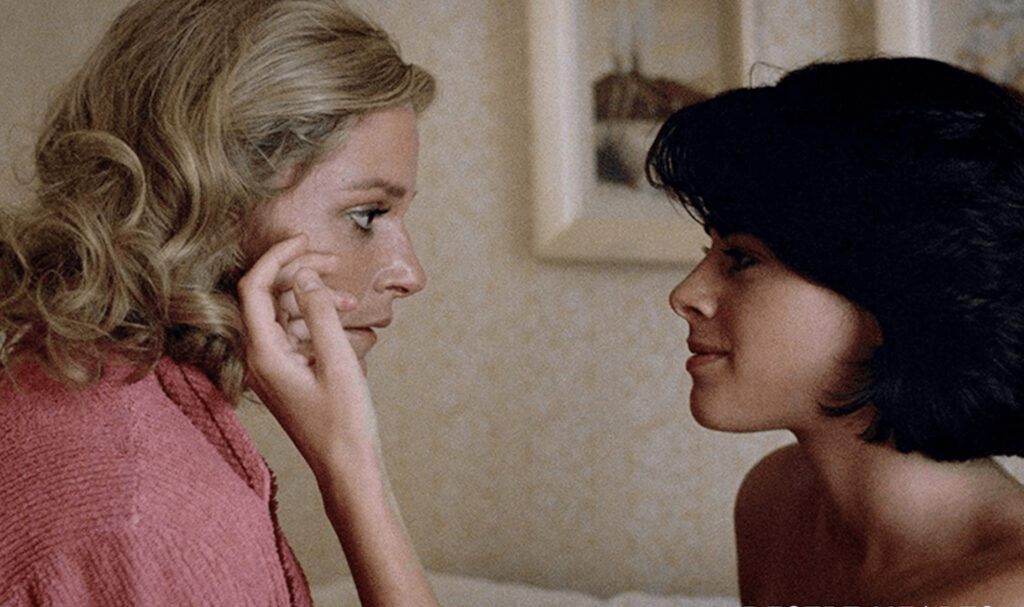Film Forum’s Sapph-O-Rama extended by popular demand!
The film festival, boasting 30 lesbian film classics and discoveries, has been extended through February 20 due to popular demand.
SAPPH-O-RAMA, a 30-film series exploring the eccentric, enduring, and genre-encompassing history of the Lesbian image in cinema, is now running at Film Forum. This swoon-worthy celebration of the sapphic canon—groundbreaking, cult favorite, or under-seen selections from the silent era to the present day—includes films by Dorothy Arzner, Chantal Akerman, Ulrike Ottinger, Cheryl Dunye, Lizzie Borden, Yvonne Rainer, Nouchka van Brakel, Céline Sciamma, John Waters, Pedro Almodóvar, and many others.
“SAPPH-O-RAMA shows that lesbian cinema extends far beyond a niche category. The thirty films on view range from the silent era to recent releases, and include international selections… Hollywood’s golden age… and American independent cinema.”
– Richard Brody, The New Yorker
Alla Nazimova and Charles Bryant’s landmark adaptation of Oscar Wilde’s SALOMÉ (1923) saw openly bisexual co-director and star Nazimova (considered the “founding mother of Sapphic Hollywood,” who coined the phrase “sewing circle” to describe the posse of queer women fraternizing in the industry), lead a rumored-to-be entirely queer cast. With costuming by Natacha Rambova, based on illustrations by Aubrey Beardsley, SALOMÉ is an artfully decadent film that exudes queer sensibility.

Dorothy Arzner’s raucous pre-Code comedy THE WILD PARTY (1929), starring Clara Bow in her—and Paramount’s—historic first ‘talkie,’ is celebrated for the sapphic implications in its portrayal of female friendships. It skyrocketed Arzner’s career, the first out Lesbian director to work in Hollywood.
Leontine Sagan’s moody, chiaroscuro-shadowed romance MÄDCHEN IN UNIFORM (1931) follows new student Manuela who falls in love with her mercurial governess at an all-girls boarding school. Subversively sensual (lingering gazes, languishing kisses) and unabashedly anti-authoritarian, the film celebrates girlhood with “masculinity brazenly and humorously represented as invertebrate and impotent, in contrast to the quicksilver vitality of the girls. This film belongs to women who are trying to find themselves–and each other–in spite of repressive structures” (Amanda Lee Koe).
Exemplifying the game of hide-and-sapphic-seek in ‘50s Hollywood: sadistic butch prison matron Hope Emerson in John Cromwell’s CAGED (1950); tough-talking, cowboy hat-donning Doris Day singing yearningly of her “Secret Love” in David Butler’s CALAMITY JANE (1953); and the butch bravado showdown between gun-slingin’ Joan Crawford and Mercedes McCambridge in Nicholas Ray’s JOHNNY GUITAR (1954).
Robert Aldrich’s X-rated THE KILLING OF SISTER GEORGE (1968), based on the 1965 Frank Marcus play, centers a bizarre love triangle between aging alcoholic and faltering soap actress Beryl Reid, her doll-obsessed younger girlfriend Susannah York, and TV executive Coral Browne. Writes Melissa Anderson in Film Comment, “Aldrich’s film endures not because it’s an example of bad, pre-Stonewall homo images but because of its sly way of celebrating dykes. Though she has lost both her girlfriend and her job, George is the only character who has not compromised herself or exploited others. SISTER GEORGE may be the first movie in which an alcoholic, unrepentant butch who molests nuns is redeemed by her unwavering commitment to her sexuality.”
The ‘70s produced a cocktail of shameless, outrageous, and audacious Lesbian characters with muddled fates in films meant to warn against–or mock–the supposed dangers of homosexuality. Among them are Jonathan Demme’s directorial debut, CAGED HEAT (1974), the all-out Lez-sploitation prison-escape rape-revenge drama, starring Barbara Steele, Erica Gavin, and Juanita Brown, with cinematography by Tak Fujimoto, and a striking, blues-inflected score by John Cale; the chilling vampire thriller DAUGHTERS OF DARKNESS (1971), starring Delphine Seyrig as an icy seductress-countess; and John Waters’ rad-dyke-al revolutionary black comedy DESPERATE LIVING (1977), that follows Mink Stole and Jean Hill on-the-run to the colorful hellscape of Mortville, reigned by fascist majesty Edith Massey, which ranks “the highest peak atop the director’s trash heap of a filmography” by The New York Times, and managed to offend so many Lesbians that their protests prevented it from being shown in some cities.
Pioneering experimental and independent filmmakers presented an honest and sobering range of stories showing Lesbian discovery, levity, and strife. Such films as Lizzie Borden’s afro-futurist BORN IN FLAMES (1983), Sheila McLaughlin’s widely underseen No Wave psycho-thriller SHE MUST BE SEEING THINGS (a Film Forum premiere in 1987), set in a lost 80s downtown New York with a bluesy saxophone score courtesy of John Zorn; Yvonne Rainer’s final feature, the darkly comic meditation on aging and late-in-life love, MURDER AND MURDER (1996); Ulrike Ottinger’s Lesbian pirate ship fantasy epic MADAME X: AN ABSOLUTE RULER (1978); Nouchka van Brakel’s A WOMAN LIKE EVE (1979), starring the drifting troubadour Maria Schneider who charms a married housewife; and Cheryl Dunye’s groundbreaking THE WATERMELON WOMAN (a Film Forum premiere in 1996).
Commercial viability brought more opportunity for touching, campy, boundary-pushing stories, making way for a diverse array of modern Lesbian classics, like Maria Maggenti’s THE INCREDIBLY TRUE ADVENTURE OF TWO GIRLS IN LOVE (1995), starring a young Laurel Holloman (The L Word’s Tina), Donna Deitch’s DESERT HEARTS (1985), Jamie Babbitt’s BUT I’M A CHEERLEADER (1999) , Alice Wu’s SAVING FACE (2004), and many more.
“Books like Vito Russo’s The Celluloid Closet and Andrea Weiss’s Vampires and Violets have chronicled the negative portrayals of lesbians in film, but the passage of time allows us to empathize with these drunken bulldaggers in doomed relationships and other larger-than-life characters,” notes Elisabeth Vincentelli. “SAPPH-O-RAMA demonstrates that our definition of a “lesbian cult classic” is now wide enough to include the coming-out favorite DESERT HEARTS and the trashiest lesbo-ploitation.”
SAPPH-O-RAMA is programmed by Andrea Torres and Emily Greenberg. It is adapted from the hit July 2000 Film Forum series of the same name (programmed by Bruce Goldstein and Michael Sayers), which spotlighted Lesbian cult movies and included 10 of the 30 titles now being presented.







FINALLY! 🙌 I’ve been waiting for this event for what feels like an eternity! As a queer film enthusiast, I can’t wait to see some of the most iconic Sapphic films on the big screen. Thank you, Film Forum, for extending the event due to popular demand. I’m going to make sure to clear my schedule and attend as many screenings as possible. 🎥💖